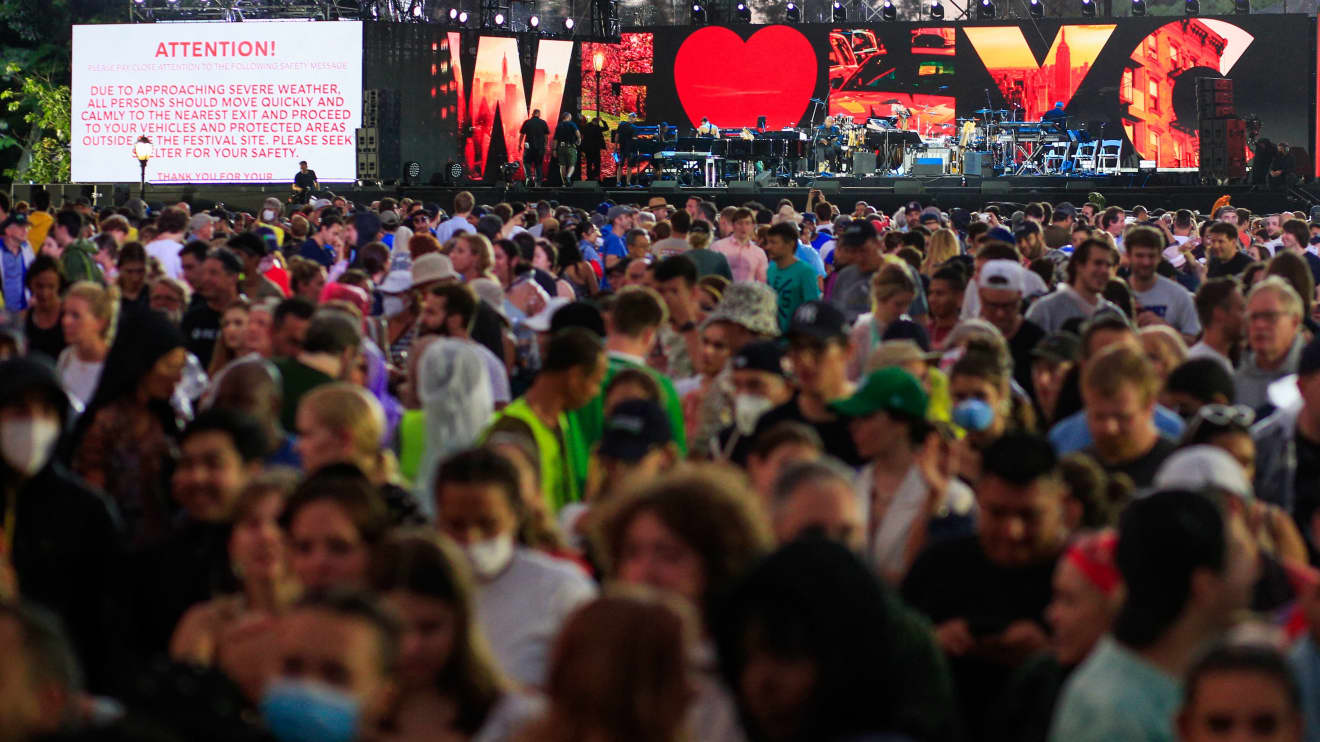This post was originally published on this site
At the start of the star-filled “Homecoming” concert in New York’s Central Park on Saturday evening, Gayle King pointed out to the crowd of tens of thousands that the sun finally appeared on what had been an otherwise cloudy day. “We’re going to party, New York-style,” said the CBS television personality.
Less than three hours later, the party was cut short — in the middle of Barry Manilow’s high-energy performance — because of a torrential rainstorm that brought thunder and lightning. Many of the scheduled big-name artists, including Bruce Springsteen, Paul Simon, Elvis Costello, and Patti Smith, never got to take the stage.
In some ways, the whole mess — and I was there and left the scene like a wet dishrag — could be considered a metaphor for New York as it continues to grapple with a pandemic that has now challenged the city for nearly a year-and-a-half. We’re all ready to return to normal, to see our metropolis thrive once again as a global hub for culture and commerce. But the rain keeps coming.
The concert, organized by music-business legend Clive Davis, was announced in early June, a time when the city truly seemed to be on a post-pandemic trajectory. The streets were filled with people. Broadway shows were planning their return. Even the subways were starting to get crowded.
But as in other parts of the country and world, the coronavirus delta variant has changed things in New York. People are suddenly hesitant to be out and about in the same way, even if they’ve been fully vaccinated against COVID-19. And the city has responded with a new set of mandates and restrictions — notably, all restaurants, gyms and event venues now must require proof of vaccination for entry.
Nevertheless, the city is still forging ahead. In the days leading up to the “Homecoming” concert, I attended a convention in town and a Broadway show, after showing my vaccination card in both instances, of course. I also had the first business lunch I’ve had since the start of the pandemic.
The “Homecoming” concert, which required proof of vaccination as well, thus became a test of sorts of the city’s efforts to move past the pandemic. Plenty of folks questioned the wisdom of holding it at a point when case counts have surged again. Around 2,000 New Yorkers are now testing positive for the virus on a daily basis, according to the New York Times tracker, up from below 200 in June.

Attendees leave the “Homecoming” concert because of the severe weather.
Kena Betancur/AFP via Getty Images
As I surveyed attendees making their way to the Central Park concert, I found few people were worried about its potential as a super-spreader event. If anything, they were still holding on to the idea of the event as a “homecoming” of sorts. “The concert seems to be an important marker,” said Staten Island resident Susan Smith-Peter, speaking as she stood on a very long entrance queue. Tickets for the event were largely free and distributed in batches, though VIP seats, costing anywhere from $399 to $4,950 were available for purchase.
And for a brief while, the concert, which was broadcast on CNN, did live up to its hype, beginning with a lickety-split rendition from the New York Philharmonic of Bernstein’s “Candide” overture to open the program. Stars of all kinds had memorable turns. Jennifer Hudson sang “Nessun Dorma” from the Puccini opera “Turandot”, in a tribute of sorts to Aretha Franklin. Guitar great Carlos Santana proved he hasn’t lost his chops.
Perhaps the highlight of those first few hours was a jam session by a host of old-school rappers, including LL Cool J, Rev Run and Busta Rhymes. Yes, it played to the fact that the concert was mostly geared to an older crowd, another minor point of controversy. But it was still a moment of giddy, unbridled fun that indeed suggested New York had its groove back.
Then, the sky opened up.
So, it wasn’t the coronavirus that ruined the homecoming, but Mother Nature. And yet, as with many matters during the pandemic, legitimate questions could be asked as to how officials handled the situation.
Given that a hurricane was due to make landfall in the U.S. Northeast by Sunday and rain had been a possibility for Saturday, was it wise for the city to hold the concert at all? And what about how Mayor Bill de Blasio confused the crowd on Saturday night, saying they should seek shelter from the storm, but suggesting the concert might return? It was fairly obvious that once the event was stopped by a thunder storm, there was no way of putting the genie back in the bottle. The mayor’s office didn’t immediately respond to a request for comment.
Perhaps this is all Monday-morning (or, to be more accurate, Sunday-morning) quarterbacking. For a brief while, the concert provided a measure of relief and, yes, fun, for a city that was once the epicenter of the pandemic and still lives under the cloud of COVID-19. The sun did really shine for a brief moment. Hopefully, it will shine soon again.

